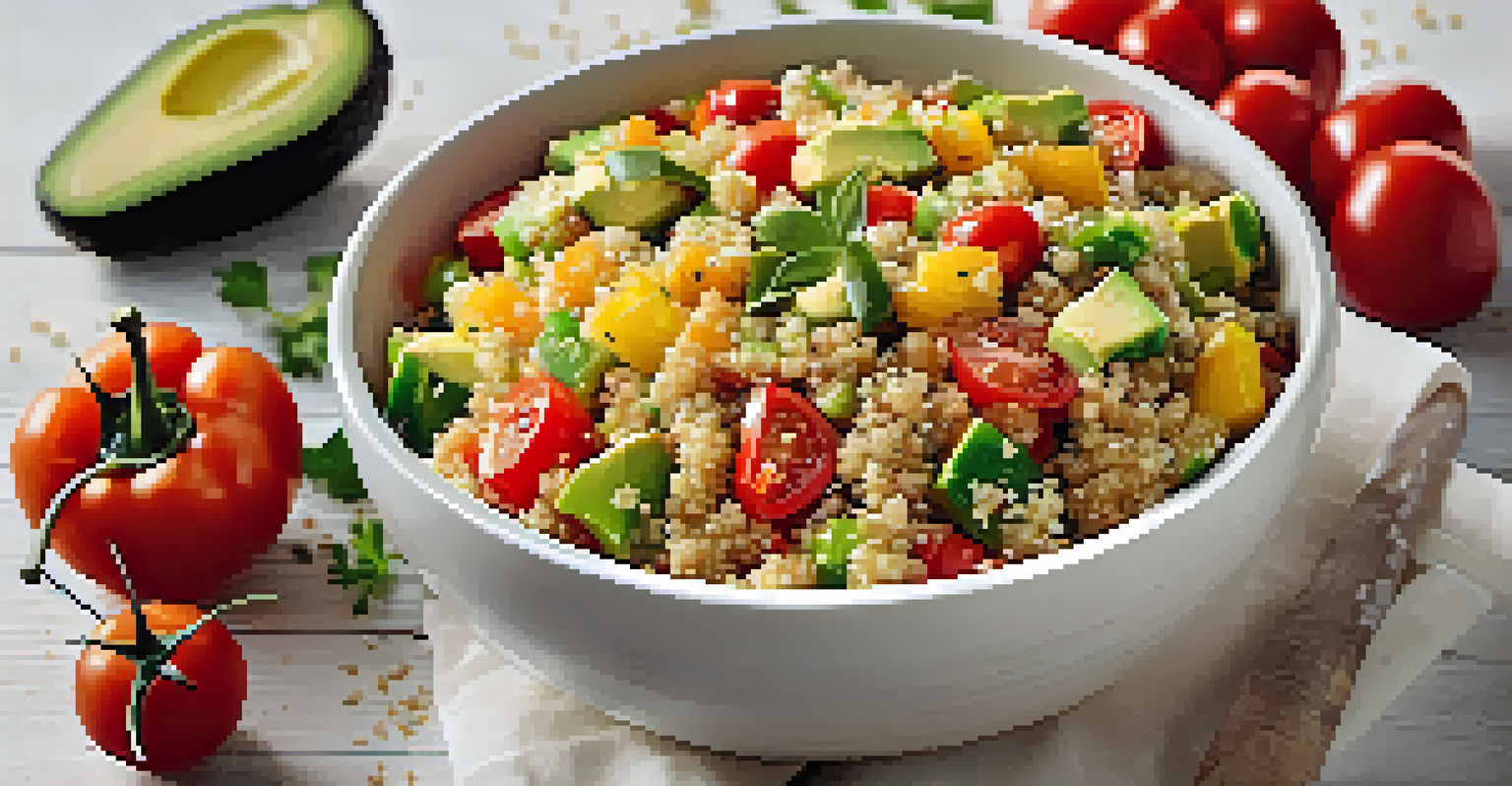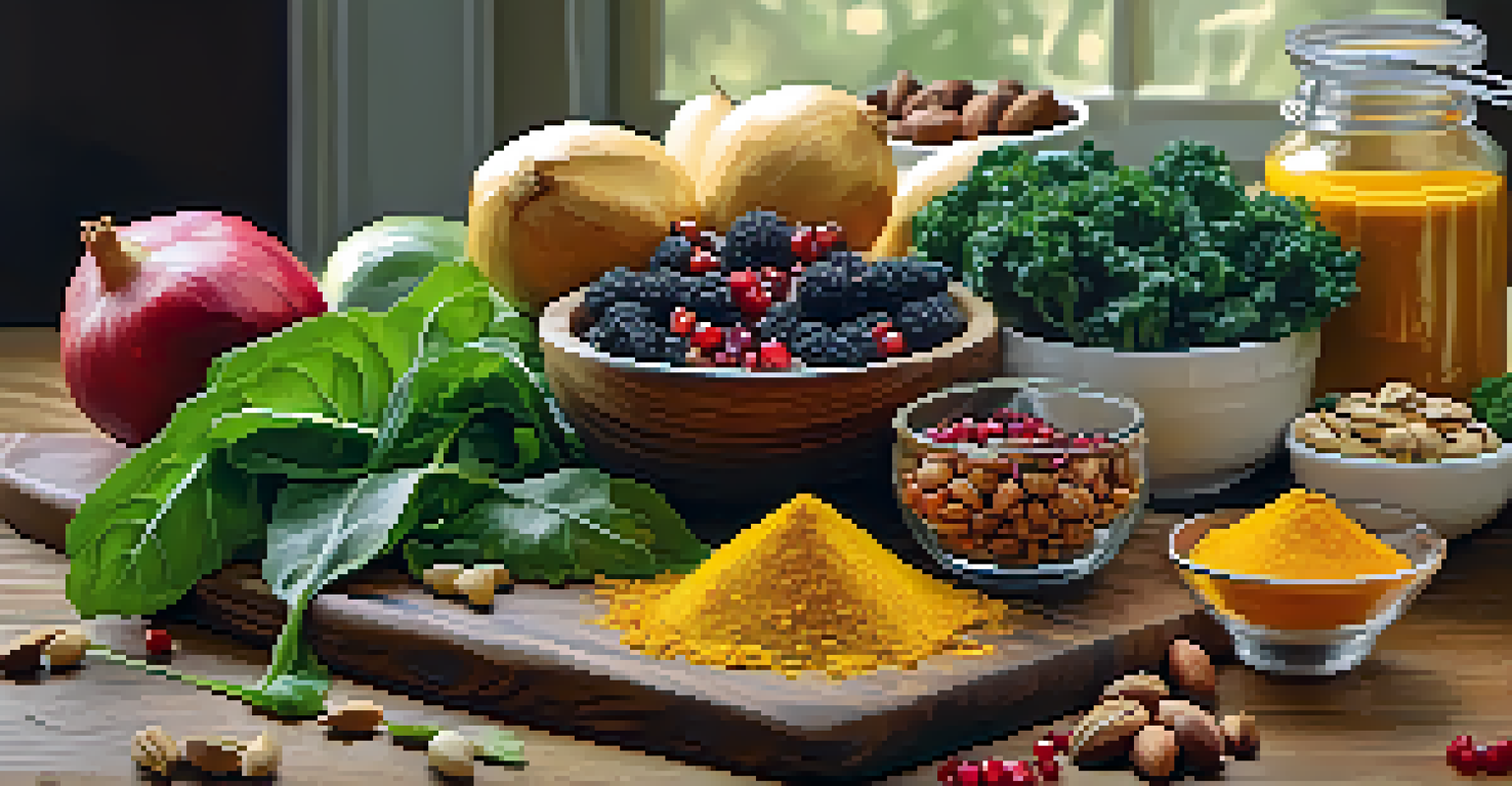The Role of Antioxidants in Vegan Diets for Heart Health

Understanding Antioxidants and Their Benefits
Antioxidants are compounds that help protect our bodies from oxidative stress, which can lead to chronic diseases. They neutralize free radicals—unstable molecules that can cause cellular damage. By incorporating antioxidants into our diets, we can enhance overall health and potentially ward off heart-related issues.
The food you eat can either be the safest and most powerful form of medicine or the slowest form of poison.
In a vegan diet, antioxidants are abundant, primarily sourced from fruits, vegetables, nuts, and whole grains. These foods not only provide essential nutrients but also help reduce inflammation, a key factor in heart disease. By understanding the role of antioxidants, vegans can better appreciate how their food choices positively impact heart health.
For example, a vibrant bowl of mixed berries, rich in anthocyanins, offers a powerful antioxidant boost. When we choose colorful foods, we’re not just enjoying them visually; we’re also investing in our heart health.
Key Antioxidant-Rich Foods for Vegans
Vegans have a wealth of antioxidant-rich options to choose from, making it easier to support heart health. Foods like spinach, kale, and broccoli are packed with vitamins C and E, both of which play critical roles as antioxidants. Incorporating these leafy greens into meals can be a delicious way to promote heart health.

Fruits such as blueberries, strawberries, and pomegranates are also excellent sources of antioxidants. These fruits not only add natural sweetness but also contribute to reducing blood pressure and improving blood vessel function. A smoothie or a fruit salad can be both a treat and a heart-healthy choice.
Antioxidants Combat Heart Disease
Incorporating antioxidant-rich foods into your diet can significantly lower the risk of heart disease by reducing oxidative stress.
Moreover, nuts and seeds, particularly walnuts and flaxseeds, provide not just antioxidants but also omega-3 fatty acids. Together, they create a powerhouse of nutrients that can significantly benefit cardiovascular health.
The Connection Between Antioxidants and Heart Disease
Research suggests that diets rich in antioxidants can lower the risk of heart disease. By combating oxidative stress, antioxidants help maintain healthy cholesterol levels and improve arterial function. This is particularly important in preventing conditions like atherosclerosis, where arteries become hardened and narrowed.
Let food be thy medicine and medicine be thy food.
In fact, a study found that individuals with higher antioxidant intake had a significantly lower risk of cardiovascular events. This highlights the potential of antioxidants not just as nutritional assets but as protective agents for heart health. The more we understand this connection, the better we can tailor our diets for optimal wellness.
For instance, incorporating a variety of colorful fruits and vegetables into daily meals can be a simple yet effective strategy. Think of it as creating a rainbow on your plate, each color representing different protective compounds for your heart.
Lifestyle Factors and Their Role in Heart Health
While antioxidants are crucial for heart health, lifestyle factors also play a significant role. Regular physical activity, maintaining a healthy weight, and managing stress levels can enhance the benefits of a nutrient-rich vegan diet. Together, these elements create a holistic approach to heart wellness.
For example, a simple daily walk not only helps manage stress but also promotes circulation, amplifying the effects of antioxidant-rich foods. This synergy between diet and lifestyle can lead to a healthier heart and overall well-being.
Variety is Key for Vegan Diets
A balanced vegan diet that includes a diverse range of fruits, vegetables, whole grains, and legumes enhances overall heart health.
It's essential to remember that heart health is not solely dependent on diet. By integrating exercise and mindfulness practices such as yoga or meditation, we can further support our hearts and improve our quality of life.
Antioxidants and Inflammation Reduction
Chronic inflammation is a silent contributor to many heart diseases, but antioxidants can help mitigate this risk. Foods high in antioxidants have been shown to decrease inflammation markers in the body. By reducing inflammation, we can lower our chances of developing heart-related issues.
For instance, turmeric, a common spice in many vegan dishes, contains curcumin, known for its powerful anti-inflammatory properties. Adding turmeric to meals can be both flavorful and beneficial for heart health.
Additionally, consuming a variety of legumes, like lentils and chickpeas, also supports inflammation reduction. These foods are not only rich in antioxidants but also provide fiber, which is essential for maintaining healthy cholesterol levels.
The Importance of a Balanced Vegan Diet
While focusing on antioxidants, it’s crucial for vegans to maintain a balanced diet that includes a variety of foods. This ensures that they receive a broad spectrum of nutrients necessary for overall health. A diverse diet can enhance the heart-healthy benefits of antioxidants by providing other essential vitamins and minerals.
Incorporating whole grains, legumes, nuts, seeds, and plenty of colorful fruits and vegetables creates a nutrient-dense plate. This approach not only supports heart health but also promotes overall wellness and energy levels.
Lifestyle Enhances Dietary Benefits
Regular physical activity and stress management complement a nutrient-rich vegan diet, further promoting heart health.
For example, a hearty quinoa salad topped with avocados, black beans, and a variety of vegetables offers a complete meal rich in antioxidants, fiber, and healthy fats. This balance is key to thriving on a vegan diet while prioritizing heart health.
Conclusion: Embracing Antioxidants for a Healthy Heart
In conclusion, antioxidants play a vital role in supporting heart health, especially within a vegan diet. By choosing a variety of antioxidant-rich foods, we can enhance our heart's resilience against disease. The impact of these compounds, combined with a balanced lifestyle, cannot be overstated.
As we embrace a plant-based lifestyle, let’s celebrate the colorful array of foods available to us. Each bite is an opportunity to nourish our bodies and protect our hearts.

So, whether it’s snacking on some berries or whipping up a delicious vegetable stir-fry, remember that every meal is a chance to invest in your heart health. Let's make those choices count!